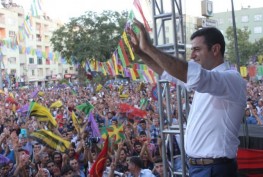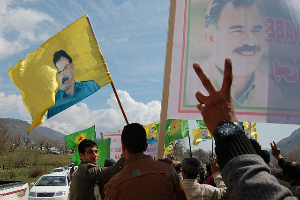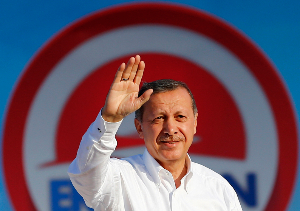What are Erdoğan’s Real Intentions in the Kurdish “Solution Process?”
By Burak Bilgehan Özpek (vol. 8, no. 5 of the Turkey Analyst)
President Recep Tayyip Erdoğan’s bid to concentrate all power to himself has increased the skepticism and reluctance among the representatives of the Kurdish political movement and among liberals. The suspicion is widespread in Turkey that the “solution process” of the Kurdish problem is going to pave the way for a fully authoritarian government. What many fear is that Erdoğan is using the solution process and the promise of Kurdish peace as instruments in his bid to consolidate his position as the unchecked leader of the country.

The HDP's Election Gambit and Turkey's Tolling Alarm Bells
By Gareth Jenkins (vol. 8, no. 2 of the Turkey Analyst)
On January 13, 2015, Selahattin Demirtaş, the co-chair of the pro-Kurdish Peoples’ Democratic Party (HDP), announced that the HDP will run as a party in the June 7, 2015 general election. If the HDP fails to cross the 10 per cent national electoral threshold not only will the country’s Kurds no longer have their own voice in parliament but nearly all of the seats in predominantly Kurdish areas are likely to go to the ruling Justice and Development Party (AKP), thus boosting President Recep Tayyip Erdoğan’s hopes of changing the constitution and introducing a presidential or semi-presidential system.

The Kurdish Nationalist Movement and the Dialogue with Öcalan
By Gareth Jenkins (vol. 7, no. 22 of the Turkey Analyst)
On November 29, 2014, Abdullah Öcalan, the imprisoned founder of the Kurdistan Workers’ Party (PKK) told a visiting delegation from the pro-Kurdish Peoples’ Democratic Party (HDP) that the Kurdish issue could be resolved – and the PKK’s 30 year-old insurgency ended – within four to five months provided that the ruling Justice and Development Party (AKP) took the appropriate measures. In reality, not only is there little prospect of breakthrough but frustration at the lack of progress has begun to highlight the struggle for relevance between different elements within the Kurdish nationalist movement.

Turkey's Presidential Election: The Clouds on Erdogan's Horizon
By Gareth Jenkins (vol. 7, no. 14 of the Turkey Analyst)
Despite his convincing victory in the presidential elections on August 10, 2014, there appears little prospect of Prime Minister Recep Tayyip Erdoğan being able to replace Turkey’s parliamentary system with a presidential one and ruling the country singlehandedly for two successive five-year terms.







